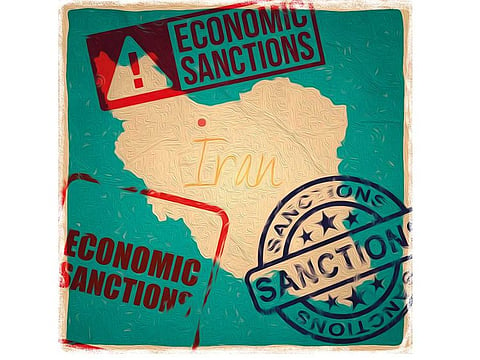New Iran sanctions rational and practical
Tehran plans to build up leverage with uranium stockpile, threatening Mideast stability

Hassan Rouhani, Iran’s president, is so inconsequential that the Trump administration didn’t even bother to impose sanctions on him. The United States has now levied them on supreme leader Ali Khamenei and eight military commanders, and is preparing similar measures against Foreign Minister Javad Zarif. It had already sanctioned Qasem Sulaimani, commander of the Quds Force, and designated the Islamic Revolutionary Guard Corps as a terrorist group.
In the virulently anti-American politics of the Islamic Republic of Iran, being targeted in this way by what they often call the ‘Great Satan’ is something of a badge of honour — one that has been denied to the Iranian president, who is regarded with open contempt by his hardline opponents and by his boss. In a certain light, then, Rouhani’s latest description of the White House as “mentally retarded” might be read as a petulant complaint that his name wasn’t on President Trump’s hit-list.
The sanctions on Khamenei may not have a great deal of impact on the ayatollah himself — he doesn’t travel beyond Iran’s borders, nor does he have any known holdings abroad. (Zarif, on the other hand, will miss his access to the salons and think tanks of New York.) It is hard to know which portions of Khamenei’s multibillion-dollar business empire might be affected, but an enterprise built by seizing the property and businesses of his subjects can, presumably, be rebuilt by seizing some more.
Rather than embark now on a lengthy process of negotiations, the White House might think it better to give the sanctions two more years to weaken Tehran’s position.Bobby Ghosh
Whatever the efficacy of the new measures, however, they are hardly a sign of madness. On the contrary, they are a sane alternative to what President Donald Trump briefly contemplated last week: A military response to Iran’s many provocations.
The regime in Tehran has said the latest sanctions close the door for negotiations forever. This is plainly disingenuous. Khamenei had already slammed that door in the face of Japanese Prime Minister Shinzo Abe, who made a good-faith effort to mediate talks between the United States and Iran, only to be humiliated by the supreme leader. Tehran has also ignored offers of mediation from some Gulf countries like Oman, and has dismissed out of hand statements from Trump and Secretary of State Mike Pompeo that the United States was open to negotiations, without preconditions.
And there were plenty of other signs that the Iranians had no intention of negotiating — the attacks on neutral shipping, on Saudi oil installations, on an American drone.
There is no such thing as forever in geopolitics. Khamenei, it would appear, is inclined to wait until after the 2020 US presidential election before reconsidering his intransigence about negotiations. He is hoping that Trump will lose the election, and that the next US president will be more favourably inclined toward the Islamic Republic. In the meantime, Iran will build up some leverage — enhancing its uranium stockpile and threatening the stability of the Middle East and safety of crucial shipping lanes.
But Trump, too, might profitably run down the clock on the current government in Tehran. There, the next presidential election is only due in 2021: Rouhani cannot run again, and it is all but certain that he will be replaced by one of the regime’s hardliners. Zarif, who is in bad odour with the same group, will be out, too — so the sanctions on him will be moot. The unelected Khamenei will remain.
Rather than embark now on a lengthy process of negotiations, the White House might think it better to give the sanctions two more years to weaken Tehran’s position. If the Islamic Republic keeps enriching uranium and attacking shipping lanes in the meantime it will antagonise the international community, prompting more countries — and especially the Europeans — to support the US position.
And when the negotiations do eventually begin, the sanctions on Khamenei could be one more piece of leverage for the American side, their removal one more small incentive to dangle before Iran’s supreme leader.
— Bloomberg
— Bobby Ghosh is a columnist and writes on foreign affairs, with a special focus on the Middle East and the wider Islamic world


